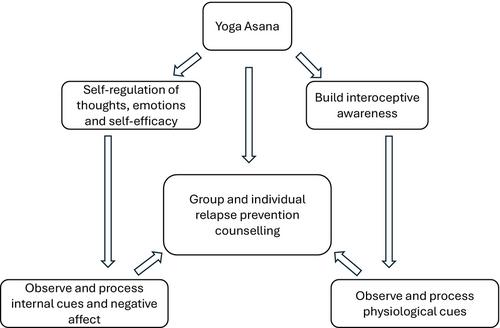‘Yoga is a way of life’ exploring experiences of yoga as a treatment for substance use: An interpretative phenomenological analysis
Abstract
Introduction
Yoga is a form of complementary medicine for substance use disorder (SUD). Randomised controlled trials involving yoga for the treatment of SUD have found that yoga practice reduces the risk of relapse and improves mood and well-being for people undergoing treatment for SUD; however, the lived experience of yoga practice involving the benefits of reducing SUD is unknown. The aim of this study was to examine the in-depth experience of yoga to inform the treatment of SUD.
Methods
Five semi-structured interviews explored experiences of yoga among people with a prior history of substance use. Four out of the five participants reported prior use of alcohol, and one reported the use of ‘GBL’ and methamphetamine. Data were analysed using interpretative phenomenological analysis.
Results
The analysis resulted in three final Superordinate themes: (1) growing awareness of the body, mind and emotions; (2) yoga opens a positive way of life; and (3) blending the worlds of yoga and 12-step recovery. Yoga was reported to enhance awareness of muscle tension, reduce physical stress, increase positive emotions and build tolerance to negative emotions. The integration of the eight-limb philosophy of yoga, notably withdrawing of the senses, helped combat internal cues and triggers (negative thoughts and emotions) for relapse. Yoga was reported to be compatible with an abstinence-based lifestyle found in 12-step mutual aid programmes and helped extend social networks to support long-term abstinence.
Conclusions
The experience of integrating the eight-limb philosophy to support abstinence and the asana practice helped participants to reduce cue reactivity. Yoga appeared to enhance interoceptive awareness, which is useful for reducing physical stress related to triggers for relapse, making yogic practice a valuable tool to integrate within mainstream group and individual relapse prevention programmes. Therefore, programmes and health policymakers may want to consider treatments that integrate yogic practices to enhance and support long-term abstinence for SUD.


 求助内容:
求助内容: 应助结果提醒方式:
应助结果提醒方式:


